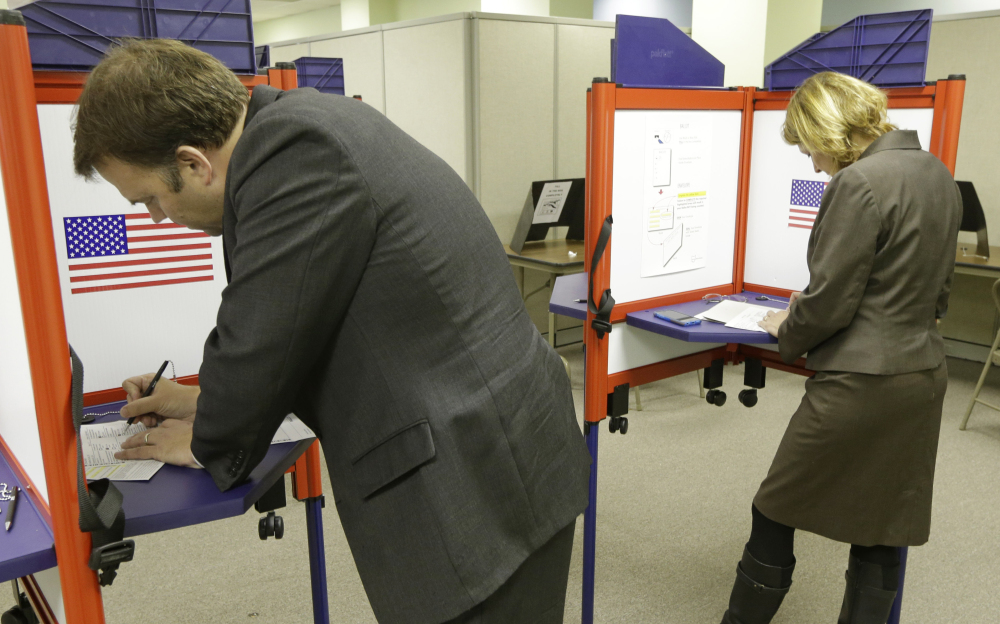WASHINGTON — Democratic efforts to increase voter turnout in next month’s election got a boost as courts blocked two of the strictest voter photo-identification laws in the U.S., in Wisconsin and Texas.
The Supreme Court on Thursday stopped a Wisconsin law that may have helped incumbent Republican Gov. Scott Walker in his fight against Democratic challenger Mary Burke. Two other actions cut the other way in the past few weeks, when the Supreme Court blocked an Ohio early-voting period and cleared a North Carolina law that eliminates same-day registration.
The North Carolina order may hurt Democratic Sen. Kay Hagan’s re-election bid against her Republican opponent, state House speaker Thom Tillis. Democrats say laws on voter identification and early voting may depress turnout among minorities and low-income Americans, who disproportionately support the party.
In Texas, a judge in Corpus Christi said the state’s alleged goal of preventing voter fraud doesn’t outweigh the discriminatory effect on the poor, blacks and Hispanics.
“The draconian voting requirements” imposed by the law “will disproportionately impact low-income Texans because they are less likely to own or need one of the seven qualified IDs to navigate their lives,” U.S. District Judge Nelva Gonzales Ramos, a 2011 appointee of President Obama, wrote in Thursday’s ruling.
A September Government Accountability Office report found that Kansas and Tennessee laws requiring photo identification to vote reduced turnout in 2008 and 2012 among young people and minorities. Those demographics tend to favor Democrats.
In Wisconsin, civil rights groups said the Chicago-based 7th U.S. Circuit Court of Appeals invited chaos by reviving that state’s law in a Sept. 12 order.
They said the state wouldn’t be able to adequately train poll workers, educate voters and get IDs into the hands of the 300,000-plus people who qualify for them. The measure is being challenged by the American Civil Liberties Union and League of United Latin American Citizens of Wisconsin.
The high court action means “our clients and the many other voters without ID will be able to vote on Nov. 4 without unnecessary obstacles,” said Larry Dupuis, legal director of the ACLU’s Wisconsin chapter. He said the group was “profoundly relieved.”
Thousands of absentee ballots had been mailed to voters before the Sept. 12 order with no mention of a photo ID requirement. Many of those ballots have already been submitted and those voters would have had to provide a photo ID.
The Supreme Court action came on a 6-3 vote. The majority issued a one-paragraph order that contained no explanation.
Justices Samuel Alito, Antonin Scalia and Clarence Thomas dissented. They said that while the treatment of absentee ballots was “particularly troubling,” the civil rights groups hadn’t met the high standard for halting an appeals court order.
Wisconsin’s 2011 law would have applied for the first time in this election.
“I believe the voter-ID law is constitutional, and nothing in the court’s order suggests otherwise,” said the state’s Republican attorney general, J.B. Van Hollen. “Instead, the court may have been concerned that even with the extraordinary efforts of the clerks, absentee ballots that were distributed before the 7th Circuit declared the law valid might not be counted.”
Wisconsin Democratic Party Chairman Mike Tate praised the ruling: “It’s good news that Scott Walker’s barriers to our most fundamental right to vote won’t be in place this November, but our plan remains the same.”
Send questions/comments to the editors.



Comments are no longer available on this story